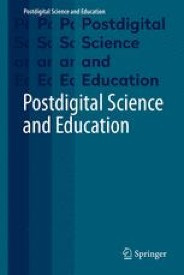Postdigital Nature Connection

Category: Publication
The links between technology use and nature connection have become an increasingly salient area of scholarly exploration (Richardson et al. 2018; Larson et al. 2019). This is set against a growing call for more cohesive approaches that articulate the complex nature of human interactions with the environment (Soga and Gaston 2022), with evidence that direct engagement with nature enhances wellbeing (Capaldi et al. 2015) and pro-environmental behaviours (Hughes et al. 2018). There is also growing acknowledgment that technology has become deeply entangled with culture, politics, education, and more (Fawns 2022; Traxler et al. 2022), prompting the emergence of postdigital theory as a critical lens for analysing how technology and networked architectures continuously shape and reshape contemporary realities. Building on the work of Jandrić et al. (2018), the postdigital acknowledges the profound and ever-expanding entanglement of digital technologies with humans. Postdigital theory prompts a re-evaluation of philosophical and empirical inquiries across various domains, including education and cultural studies. The field of nature connection has yet to fully engage with this paradigm-shifting theory, leaving uncertainty regarding how the postdigital might help illuminate the complex interplay between humans and nature in an increasingly technological world. Reed (2024a) argues that postdigital nature connection encourages an interrogation of the entangled relationships between technological architectures, social actors, and in-person and online engagements with nature, and how these reframe human-nature connections. By transcending the binary of ’digital’ versus ’non-digital’, he situates nature connection within a hypermediated and interconnected on-and-offline landscape where algorithms, networked platforms, and biodigital entanglements shape perceptions, experiences, and meanings of nature. Postdigital nature connection encourages critical examinations of the sociotechnical forces that come to mediate and shape contemporary relationships with nature, especially for young people, and could offer the foundation required to explore how digital architectures construct and redefine nature in the cultural imagination. This book kickstarts further explorations of postdigital nature connection, with emphasis placed on philosophical and theoretical development or critique, empirical nature connection evidence, new postdigital perspectives, and the relationships between postdigital theory and formal and non-formal educational practices for developing nature connection. The list below provides an initial outline on the direction of possible contributions: • Hybridity, convergence, and entanglement in the development of nature connection. • Disentanglement and disentangling tactics beyond assessments of digital versus non-digital (Adams 2024). • Postdigital nature connection and forms of nature-based learning and outcomes (Reed 2024b). • Indigenous, Global South, and decolonial perspectives. • How datafication and algorithms intersect with and inform a sense of nature connectedness. • Relationships between artificial intelligence and nature connection. • More-than-digital meaning making and the co-construction of nature connection (Bhatt and Gourlay 2024). • Other contributions within the remit of postdigital nature connection. Editor Important Dates 11 April 2025 – Deadline for abstracts (500 words). 1 September 2025 – Deadline for full chapters. 1 October 2025 – Deadline for reviewer feedback. 15 December 2025 – Deadline for final chapters.
Initiator(s):
Jack Reed
,
University of Exeter UK
Deadline: 11.04.0025
Publication-Type: Book
https://docs.google.com/document/d/14TjqO-IVDXOLHyKqeli3yig1YOrXnJy8a4G7TpQyHik/edit?tab=t.0
Post created by: Lymor Wolf Goldstein